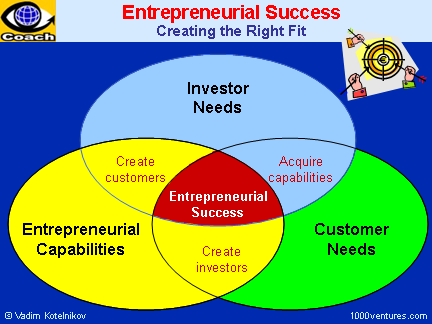|

|
Entrepreneur
According to John Thompson,
entrepreneur is a person who habitually creates and innovates to build
something of recognized value around perceived opportunities.
In this definition, all words are key words:
-
'Entrepreneur' can be an individual
entrepreneur, but also an entrepreneurial team or even
entrepreneurial organization
-
'A person' emphasizes a personality
rather than a system
-
'Habitually' just cannot stop being an
entrepreneur
-
'Creates'
starts from scratch and brings into being something that was not there
before
-
'Innovates'
able to overcome obstacles that would stop most people;
turns problems and risks into opportunities; delivers - sees ideas
through to final application
-
'Builds something' describes the
output of the creation and
innovation process
-
'Of recognized value' encompasses
economic, commercial, social, or aesthetic value
-
'Perceived opportunities'
spotting the opportunity to exploit an idea that may or may not be
original to the entrepreneur; seeing something other miss or only see in
retrospect1
Steve Jobs is
one of the most successful entrepreneurs of our generation.
His success story is
legendary.
 Put up for adoption at an early age, dropped out of college after 6
months, slept on friends floors, returned coke bottles for 5 cent deposits to
buy food, then went on to start Apple Computers and Pixar Animation Studios. Put up for adoption at an early age, dropped out of college after 6
months, slept on friends floors, returned coke bottles for 5 cent deposits to
buy food, then went on to start Apple Computers and Pixar Animation Studios.
Steve Jobs' advice to all entrepreneurs is:
Jim Clark is a serial entrepreneur who became a
billionaire in the 'Internet age'. He was involved in starting Netscape, Silicon
Graphics and many other
start-up ventures.
When asked "What Traits Should
Every Good Entrepreneur Possess?", Jim answered, "Discontent
and anxiety. Most entrepreneurs are not content with the way things are.
But if they're smart, they're extremely anxious too. Most ideas are going to
happen whether you do them or someone else does. It's the person who feels most
anxious about it and
builds the prototype who is likely to win. The best entrepreneurs tend to
move quickly and efficiently. They don't waste a lot of time
making decisions."
Ross Perot has become a
billionaire by discovering a customer need and filling it. When Ross Perot was
working for IBM, he saw that his customers who were buying IBM computers, needed
help in processing their data. He went to IBM with the idea of creating such
service but they said they weren't interested. Ross Perot started his own
business and eventually sold it out for $2.8 billion dollars.
Source: Sam's Club
Sam Walton, the founder of Wal-Mart, grew up poor in a farm
community in rural Missouri during the Great Depression. The
poverty he experienced while growing up taught him the value
of money and to persevere.
After attending the University of Missouri, he immediately
worked for J.C. Penny where he got his first taste of
retailing. He served in World War II, after which he became
a successful franchiser of Ben Franklin five-and-dime
stores. In 1962, he had the idea of opening bigger stores,
sticking to rural areas, keeping costs low and discounting
heavily. The management disagreed with his vision.
Undaunted, Walton pursued his vision, founded Wal-Mart and
started a retailing success story. When Walton died in 1992,
the family's net worth approached $25 billion.
Today, Wal-Mart is the world's #1 retailer, with more than
4,150 stores, including discount stores, combination
discount and grocery stores, and membership-only warehouse
stores.
Amazon.com is a company that is closely tied with the
e-commerce phenomenon.
Jeff Bezos, the founder of the company,
broke the rules of the book business by using the Internet rather than
conventional distribution channels.
Based in Seattle, USA, the company has grown
from a book seller to a virtual Wall Mart of the Web selling products as diverse
as music CDs, software, office products, electronics, toys, games, cookware,
hardware, food, and health products. The company has also grown at a tremendous
rate with revenue rising from about US$150 million in 1997 to US$5.2 billion in
2003.
|